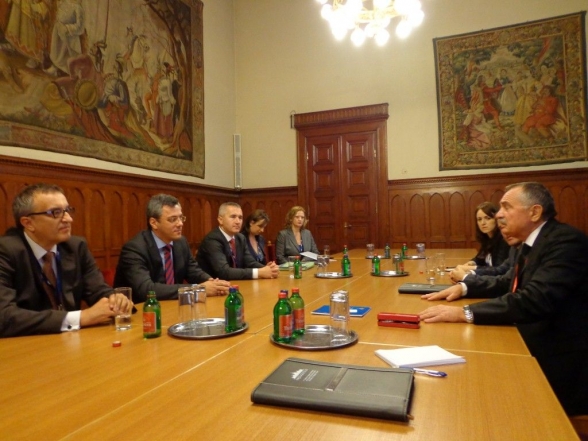Sixth Conference of the Speakers of the Parliaments of the Western Balkans countries in Budapest, attended by the Vice President of the Parliament of Montenegro Mr Branko Radulović, addressed security policy issue in the Western Balkan countries during the second session.
Security policy in the Western Balkan countries drew the special attention of all present, with general position that a certain result has been achieved in security policy and that the cooperation in this area is intensified when compared to the period of the last conference, but not to the extent sufficient to provide the necessary level of stability, as a precondition to the overall development of the whole region.
Vice President Radulović emphasized that security of the Western Balkans was going through transition process - from a relatively good defined security structure to other which still was not clear enough. He said that the international consensus on political and security policy of Balkans was under the question mark to the certain extent, and that the old forces were losing their influence and probably interest – while new forces were getting increasingly important role. According to him, there are plenty examples for that.
He also emphasised that, on the other hand, there were a number of reforms and initiatives on regional cooperation, including meetings of ministers of home affairs, forums organised for experts from this field and traditional debates of regional security services with security services of EU and NATO institutions.
In addition, regional initiatives should be raised to higher institutional level, supported politically, so they could achieve the necessary effects in fighting all forms of organised crime, overtaking joint measures in prevention and fight against all forms of terrorism as well as in combating consequences of natural disasters and climatic change. The proposal of the Vice President Radulović is supported by all participants of the Conference.
He particularly stressed that, under the auspices of the European Commission, the strategy for developing the security structure of Balkans should be developed, as well as the strategy for developing energetics in Balkans and strategy for developing infrastructure of Balkans.
When it comes to Montenegro, during the session, Vice President Radulović emphasised that Montenegro had preserved and enhanced multi-ethnic harmony and that it would face the opening of chapters 23 and 24 dealing judiciary and fundamental rights, i.e. justice, freedom and security in the negotiation process with the EU, where political readiness and institutional capacities of Montenegro would be shown to the full extent regarding exercising of those rights.
At the end of the Conference, it was concluded that Hungary, as the host, would jointly with the European Commission further realise and institutionalise the agreement reached.
During the Conference, the Vice President Radulović held a number of bilateral meetings, with the following: Speaker of the Hungarian Parliament Mr László Kövér, Speaker of the Croatian Parliament Mr Josip Leka, Speaker of the National Assembly Mr Nebojša Stefanović, Speaker of the Macedonian Parliament Mr Trajko Veljanovski, Speaker of the Albanian Parliament Mr Ilir Meta and Speaker of Bosnia and Herzegovina House of Speakers Mr Ognjen Tadić
During the meetings, a set of activities regarding the cooperation among parliaments was agreed, but also joint initiatives and projects, so the mutual cooperation would be intensified and more useful for Montenegro and its neighbouring countries.









